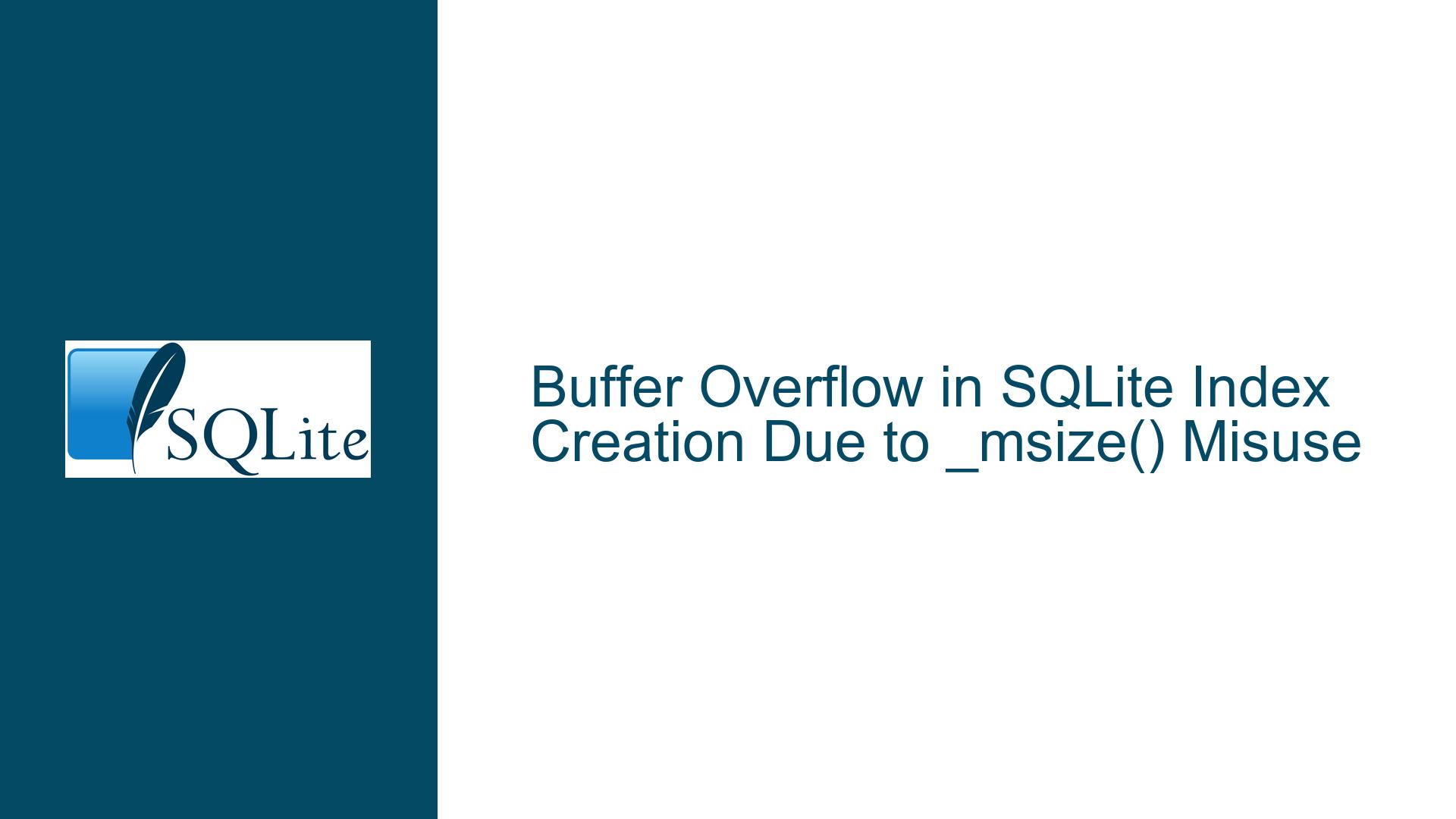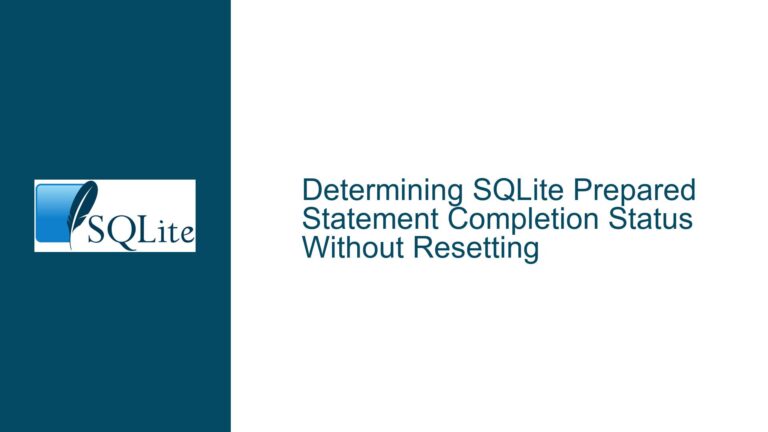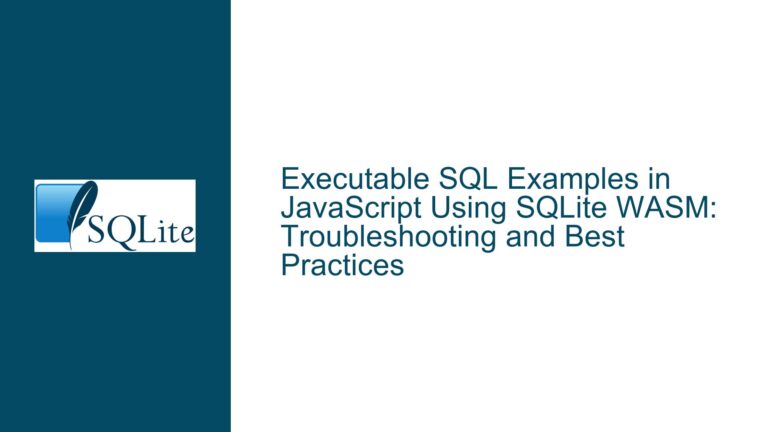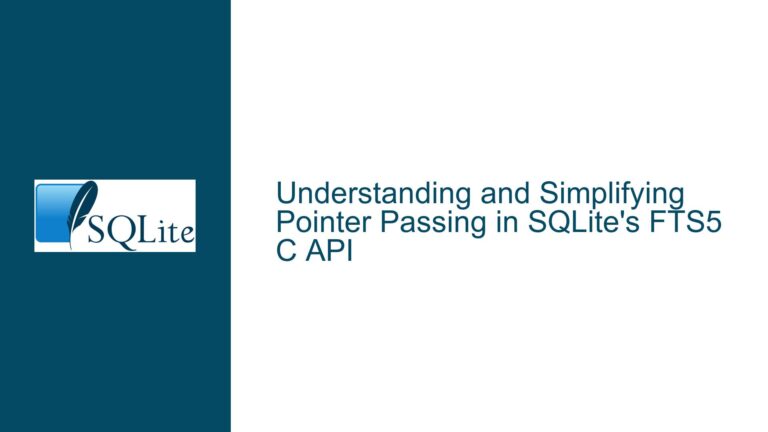Buffer Overflow in SQLite Index Creation Due to _msize() Misuse
Buffer Overflow During Index Creation in SQLite on Windows
When creating an index in SQLite on a Windows platform, a buffer overflow can occur due to the misuse of the _msize() function. This issue manifests specifically during the creation of an index, where SQLite allocates memory for constructing an INSERT INTO 'main'.sqlite_master statement. The overflow is detected by a checked heap, which identifies that one extra byte is being written beyond the allocated memory boundary. This problem is particularly intriguing because it only occurs with specific index names and can be avoided by altering the length of the index name.
The core of the issue lies in how SQLite interacts with the memory allocation functions on Windows, particularly when using debug versions of the C runtime libraries. SQLite relies on _msize() to determine the size of an allocated memory block, but in debug builds, _msize() resolves to _msize_dbg(), which includes additional debug information in the size calculation. This discrepancy leads to SQLite writing beyond the intended memory boundary, causing a buffer overflow.
Interplay Between _msize() and Debug Heap Instrumentation
The root cause of the buffer overflow is the interaction between SQLite’s memory management and the debug heap instrumentation provided by the Microsoft C Runtime (MSCRT) library. In debug builds, the MSCRT replaces standard memory allocation functions with their debug counterparts, which include additional guard bytes and metadata to help detect memory corruption. When SQLite calls _msize() to determine the size of an allocated block, it receives a value that includes these guard bytes, leading to an incorrect assumption about the available memory.
The _msize() function, when used in a debug build, resolves to _msize_dbg(), which returns the total size of the memory block, including the debug overhead. SQLite, however, expects _msize() to return only the usable portion of the memory block, as defined by the standard behavior of malloc_usable_size() on other platforms. This mismatch causes SQLite to write data beyond the intended boundary, triggering a buffer overflow.
The issue is further complicated by the use of third-party memory instrumentation tools, such as those provided by CppUTest, which add their own guards and metadata to memory allocations. If these tools do not replace _msize() with a compatible version, SQLite may receive an incorrect size value that includes the additional instrumentation overhead, exacerbating the buffer overflow problem.
Resolving the Buffer Overflow with SQLITE_WITHOUT_MSIZE
To address the buffer overflow issue, the most effective solution is to compile SQLite with the -DSQLITE_WITHOUT_MSIZE flag. This flag instructs SQLite to avoid using the _msize() function and instead rely on its own internal memory management routines. While this approach may result in slightly less efficient memory usage, it ensures that SQLite operates correctly in environments where _msize() behaves unexpectedly, such as in debug builds or when using third-party memory instrumentation tools.
When -DSQLITE_WITHOUT_MSIZE is defined, SQLite substitutes its own implementation for determining the size of allocated memory blocks. This implementation does not rely on platform-specific functions like _msize() and is therefore immune to the inconsistencies introduced by debug builds or third-party tools. By using this flag, developers can avoid the buffer overflow issue without modifying their application code or the SQLite library itself.
In addition to using -DSQLITE_WITHOUT_MSIZE, developers should ensure that their build environment is consistent with the target deployment environment. For example, if the application will be deployed on an embedded platform that does not support _msize(), it is advisable to test the application in a similar environment during development. This practice helps identify and resolve potential issues before they occur in production.
For developers who cannot use -DSQLITE_WITHOUT_MSIZE, an alternative approach is to modify the SQLite source code to account for the debug overhead when _msize() is called. This can be achieved by subtracting the size of the debug metadata from the value returned by _msize(). However, this approach is more complex and error-prone, as it requires a deep understanding of both SQLite’s memory management and the specific behavior of the debug heap on the target platform.
In conclusion, the buffer overflow issue during index creation in SQLite on Windows is caused by the misuse of the _msize() function in debug builds. By compiling SQLite with the -DSQLITE_WITHOUT_MSIZE flag, developers can avoid this issue and ensure that their applications operate correctly in all environments. For those who cannot use this flag, careful management of memory allocation and debugging tools is necessary to prevent buffer overflows and other memory-related issues.






